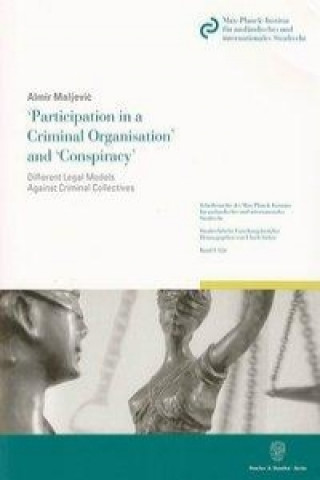
Code: 12720873
'Participation in a Criminal Organisation' and 'Conspiracy'
by Almir Maljevic
The extension of criminalisation to include the early preparatory stages of the commission of criminal offences represents one of the most debatable issues in modern criminal law. In response to some of the most complex forms of c ... more
- Language:
 English
English - Binding: Paperback
- ISBN-13: 9783861138396
Publisher: Duncker & Humblot GmbH, 2011
- More about this

You might also like
-

Dune
35.33 zł -33 % -

Haunting Adeline
125.29 zł -2 % -

Berserk Deluxe Volume 2
214.34 zł -1 % -

White Nights
15.53 zł -23 % -

Powerless
44.77 zł -19 % -

Atomic Habits
80.31 zł -19 % -

Dune Messiah
46.70 zł -3 % -

Berserk Deluxe Volume 3
221.96 zł -

One Day
32.89 zł -36 % -

Berserk Deluxe Volume 1
213.53 zł -2 % -

Iron Flame
61.62 zł -28 % -

Surrounded by Idiots
51.57 zł -19 % -

Harry Potter and the Prisoner of Azkaban (Minalima Edition)
171.80 zł -2 % -

Gravity Falls Journal 3
89.75 zł -1 % -

Heaven Official's Blessing: Tian Guan Ci Fu (Novel) Vol. 1
89.75 zł -1 % -

The Creative Act
101.02 zł -15 % -

Dune
38.37 zł -38 % -

Hunting Adeline
131.18 zł -1 % -

A Little Life
48.93 zł -12 % -

Children of Dune
47.11 zł -2 % -

Heaven Official's Blessing: Tian Guan Ci Fu (Novel) Vol. 2
96.55 zł
Availability alert
Enter your e-mail address and once book will be available,
we will send you a message. It's that simple.
More about 'Participation in a Criminal Organisation' and 'Conspiracy'
 Book synopsis
Book synopsis
The extension of criminalisation to include the early preparatory stages of the commission of criminal offences represents one of the most debatable issues in modern criminal law. In response to some of the most complex forms of crime usually committed by criminal collectives (such as terrorism, organised crime, or economic crime), different legal systems have developed diverse legal models to address the problem. All in all there are two main models. Countries of the continental criminal law tradition usually rely on the 'participation in a criminal organisation/association' model, whereas countries of the common law tradition utilise the 'conspiracy' model. These models, although having similar functions (to criminalise the early preparatory stages of the commission of criminal offences), are very different in their constitutive elements. This book, for the very first time, explains the differences between the two types of models and points out the process of transfer of their elements from traditional models (Germany and England and Wales) to the international models (UN and EU), and furthermore to transitional models (Bosnia and Herzegovina, Croatia, and Serbia). The author is of the opinion that the differences between the two types of models are such that they cannot be seen as viable alternatives in criminal law, as suggested by the international models. He therefore suggests that the fight against criminal collectives requires cumulative criminalisation using both models in order to be effective.
 Book details
Book details
- Full title: 'Participation in a Criminal Organisation' and 'Conspiracy'
- Subtitle: Different Legal Models Against Criminal Collectives
- Author: Almir Maljevic
- Language:
 English
English - Binding: Paperback
- EAN: 9783861138396
- ISBN: 3861138395
- ID: 12720873
- Publisher: Duncker & Humblot GmbH
- Weight: 451 g
- Dimensions: 225 × 154 × 19 mm
- Date of publishing: February 2011
safisfied customers
Since 2008, we have served long line of book lovers, but each of them was always on the first place.
Copyright! ©2008-24 libristo.pl All rights reservedPrivacyPoučení o cookies



 21 million books
21 million books Delivery 12.99 zł
Delivery 12.99 zł (32) 444 93 66 (8-15.30h)
(32) 444 93 66 (8-15.30h)